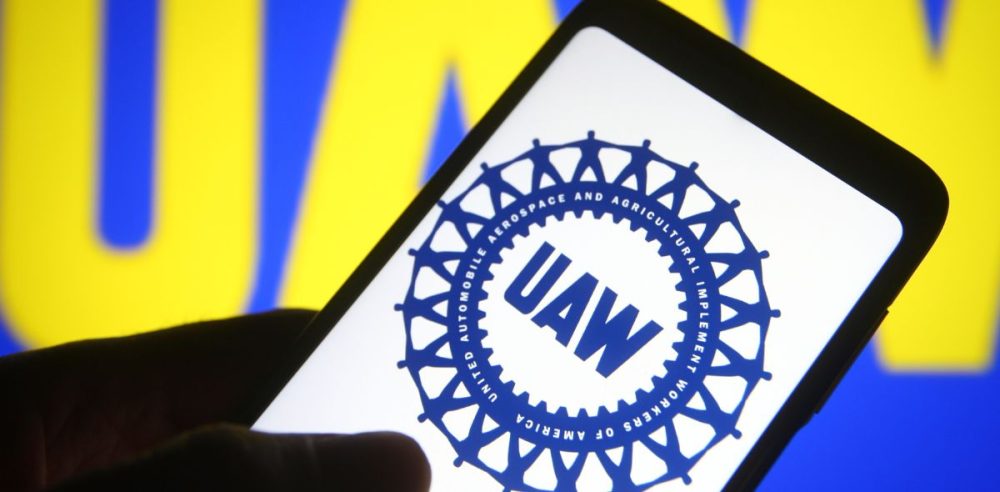United Auto Workers (UAW) President Shawn Fain extended an olive branch to President Donald Trump’s new administration.
“The UAW supports aggressive tariff action to protect American manufacturing jobs as a good first step to undoing decades of anti-worker trade policy. We do not support using factory workers as pawns in a fight over immigration or drug policy,” the automotive labor union chief said on X on February 1.
? From UAW President Shawn Fain:
"The UAW supports aggressive tariff action to protect American manufacturing jobs as a good first step to undoing decades of anti-worker trade policy. We do not support using factory workers as pawns in a fight over immigration or drug policy.
— UAW (@UAW) February 2, 2025
Fain then shared his belief that Trump’s tariff policy is necessary to halt the de-industrialization the American economy has undergone in recent decades. “We are willing to support the Trump Administration’s use of tariffs to stop plant closures and curb the power of corporations that pit US workers against workers in other countries.”
However, his comments included some criticisms. Fain took Trump to task for “dissolving collective bargaining agreements and gutting the National Labor Relations Board,” two common tools used by labor unions.
Fain also took a dig at Free Trade Agreements for destroying blue-collar jobs, something he and Trump would agree on. Trump was critical of free trade during his 2016 presidential bid and frequently railed against it, once calling NAFTA “the worst trade deal maybe ever.”
President Trump said in 2018, “Since NAFTA’s adoption, the United States… lost 4.1 million manufacturing jobs, and 1 in 4 auto jobs. Lost about 25 percent of our auto jobs — even more than that.”
As the 45th President, Trump would negotiate the USMCA, a trade deal that repealed and replaced NAFTA. During the signing ceremony, Trump promised that the USMCA would be a boon for auto workers.
At the time of the agreement’s ratification, UAW appeared cagey but was not outwardly critical. “We will be watching,” a 2020 statement read.
Since then, the labor organization has sought higher tariffs against foreign auto imports from places like Mexico. Fain’s February 1, 2025, social media posts continued to signal displeasure with the USMCA.
The closer relationship between Trump and one of America’s largest labor organizations comes after the UAW had a public falling out with then-President Joe Biden in the fall of 2023. During this strike, former UAW president Bob King said in an interview, “UAW members feel abandoned by the Democratic Party.”
King’s statement was partly predicated upon the labor organization’s frustration with Biden’s electric vehicle mandate, a policy that many trade unionists felt would reduce the number of American autoworkers required to build cars and would ship more jobs overseas. Although Biden eventually joined the UAW workers on the picket line in an ostensible show of solidarity, he only took this action after weeks of icy relations with the organization.
Eventually, the UAW issued what was widely reported as an unenthusiastic endorsement of Biden before the Democratic nominee dropped out and was replaced by Vice President Kamala Harris.
Fain’s X remark on February 1 was clear:
We need to stop plant closures, bring back American jobs, and stop the global race to the bottom immediately. Any tariff action must be followed with a renegotiation of the USMCA, and a full review of the corporate trade regime that has devastated the American and global working…
— UAW (@UAW) February 2, 2025
Lots of very smart people in the comments are shocked to learn that their beloved unions are protectionist https://t.co/UWXeQu5SvJ
— ??️Mr. Remote?️? (@TheKeplarHermit) February 2, 2025
Other users objected to the degree to which they anticipated tariffs to be raised.
“Blanket tariffs don’t help workers. They significantly increase manufacturing costs on what little is still produced here. Reasonable competitive advantage tariffs on finished goods, sure. Tariffs on raw materials and necessities we don’t produce here will only hurt us all. No one wins in a trade war,” posted another responder.


